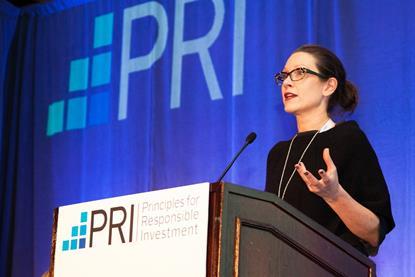Social issues - blogs
Part III: ESG factors and returns – a review of recent research
Prior to February 2022, research typically showed strong performance from sustainable and ESG strategies relative to the broad market. Industry research since then has looked at how this approach has held up in the wake of outperformance by energy and defence stocks.
The defence sector in focus: Common ESG risks
Nikolaj Halkjaer Pedersen, Senior Lead at the PRI’s Human Rights and Social Issues team, says investors should be cautious before re-assessing their defence positions.
Do financial incentives drive the voting behaviour of ESG funds?
By Tao Li, The University of Florida; Lakshmi Naaraayanan, London Business School; Kunal Sachdeva, Rice University
Amplification, not apathy: Investor proxy votes increasingly challenge corporates in 2023
By Bonnie Groves, Specialist, Stewardship and Yejin Hur, Intern, Stewardship
Taking a proactive approach to human rights
By Soh-Won Kim, Analyst, and Nikolaj Halkjær Pedersen, Senior Lead, Human Rights and Social Issues, PRI
10 years since Rana Plaza: What progress has been made and what can investors do?
By Soh-Won Kim, Analyst, Human Rights and Social Issues
Why we must act faster to enable the climate transition
By David Atkin, CEO, Principles for Responsible Investment
How US anti-ESG laws raise borrowing costs for public finance
By Daniel Garrett, The Wharton School of the University of Pennsylvania; and Ivan Ivanov, Federal Reserve Bank of Chicago
The role of the PRI in a changing world
By David Atkin, CEO, Principles for Responsible Investment
Biden weighs in on the battle for the soul of Wall Street
By David Atkin, CEO, Principles for Responsible Investment
Responsible private equity: Our data reveals some emerging best practices but there is more work to do
By Daram Pandian, Associate, Private Equity & Venture Capital, and Peter Dunbar, Head of Private Equity, PRI
The effectiveness of divestment strategies
By Alex Edmans, London Business School; Doron Levit, University of Washington; and Jan Schneemeier, Indiana University
Sustainability outcomes: How can investors support the development of meaningful data?
By Stephen Andrews, Senior Data Analyst, and Julie Hammer-Monart, Senior Analyst, Sustainability Outcomes
Why we need to talk about resourcing stewardship
By Clara Melot, Specialist, Stewardship (Active Ownership 2.0), PRI
Altruism or self-interest: What drives employees to invest in their companies?
By Maxime Bonelli, HEC Paris; Marie Brière, Amundi, Paris Dauphine University, and Université Libre de Bruxelles; and François Derrien, HEC Paris
PRI at COP27 – Reflections on week one
By David Atkin – Chief Executive Officer, PRI
Venture capital investors must take ESG due diligence seriously – our new DDQ can help
By Daram Pandian, Associate, Private Equity & Venture Capital, and Peter Dunbar, Head of Private Equity, PRI
The human right to a healthy environment provides a strong mandate to investors
By Louisa Guy, UK Policy Analyst, PRI
AI-related ESG risks: What investors need to know
By Ravit Dotan PhD, independent AI Ethics Consultant & Researcher, and Daram Pandian, Associate, Private Equity & Venture Capital, PRI
What does the Roe v. Wade ruling mean for investors?
By Remi Fernandez, Specialist, Human Rights & Social Issues, and Betina Vaz Boni, Senior Analyst, Governance, PRI
Criticising ESG incorporation does not make it any less essential
By David Atkin, CEO, Principles for Responsible Investment
The 2022 AGM season: Which ESG issues have shareholders targeted?
By Rob Henry, Intern, Stewardship team
The net-zero transition in China: progress has been made, but challenges remain
By Nan Luo, Head of China, PRI
PRI launches diversity, equity and inclusion DDQ for institutional investors
By Elena Espinoza, Senior Specialist, Social Issues, PRI and Shaska Chirinos, Relationship Manager, Signatory Relations, Americas, PRI
A new social contract: Ensuring decent work in the low-carbon economy
The case has been made for the transition to a low-carbon economy. The question is no longer ‘why’ but ‘how’
What does international conflict mean for responsible investment?
By Nathan Fabian, Chief Responsible Investment Officer, PRI
Breaking the bias: International Women’s Day at the PRI
By Mandy Kirby, PRI Chief Reporting Officer and DEI champion
COP26 must keep a 1.5-degree world alive
By Sagarika Chatterjee, Director of Climate Change, PRI
PRI launches venture capital collaboration to strengthen ESG take-up
By Peter Dunbar, Senior Specialist, Investment Practices, PRI, Hannah Leach and Johannes Lenhard, VentureESG
How global supply chain networks shape CSR around the world
By Christoph M. Schiller, Arizona State University, W.P. Carey School of Business
AGM season 2021: an analysis of trends
By Kitty Woodham, Stewardship Intern, PRI
PRI Digital Forum: what levers do investors have to shape sustainability outcomes?
By Elsa Savourey, Senior Lead, Sustainability Outcomes, PRI
ESG rating disagreements: why is corporate virtue so subjective?
By Dane Christensen, University of Oregon; George Serafeim, Harvard Business School, and Anywhere Sikochi; Harvard Business School
What can we learn from corporate responses to ESG ratings?
By Rieneke Slager, University of Groningen and Jean-Pascal Gond, City, University of London
Reconciliation and responsible investment: Growing the Indigenous economy in Canada
By Katie Wheatley, Manager, Reconciliation & Responsible Investment Initiative, SHARE and Lindsey Walton, Head of Canada for Signatory Relations, PRI
Global evolution of responsible investment
By Eduardo Atehortua, Head of LATAM (ex-brazil), PRI
Vaccine nationalism – why responsible investors must change the course of action
By Fiona Reynolds, CEO, PRI
The case for infrastructure investors to go further on human rights
By Simon Whistler, Senior Specialist, Investment Practices, PRI
Whistleblowing through the social and governance lenses
By Betina Vaz Boni, Analyst, Governance Issues, PRI and Elena Espinoza, Acting Head, Social Issues, PRI
What institutional investors need to know about the ‘S’ in ESG
By Fiona Reynolds, CEO, PRI and John Ruggie, author of the UN Guiding Principles and professor at Harvard’s Kennedy School of Government
US investor perspectives on diversity, equity and inclusion
By Carol Jeppesen, Head of the US, PRI
Environmental and social policies pay off when times are tough
By Rui Albuquerque, Carroll School of Management, Boston College, CEPR and ECGI, Yrjo Koskinen, Haskayne School of Business, University of Calgary, Shuai Yang, Haskayne School of Business, University of Calgary, and Chendi Zhang, University of Exeter Business School
Investors must act now to tackle deforestation and threats to indigenous people in the Amazon
By Nabylah Abo Dehman, Manager, Social Issues, Isabella Coin, Analyst, Environmental Issues, and Maria De Filippo, Senior Specialist, Environmental Issues, all at the PRI
Shaping an inclusive, green and sustainable recovery
By Fiona Reynolds, CEO, PRI
When Harry fired Sally: uncovering the gender punishment gap
By Mark Egan, Harvard University; Gregor Matvos, Northwestern University; Amit Seru, Stanford University
Beyond ESG incorporation: how the SDGs can help investors shape outcomes in the world
By Shelagh Whitley, Director of ESG and SDGs, PRI and Marcel Jeucken, Managing Director, SustFin Ltd.
Responsible investors must unite for racial justice
By Fiona Reynolds, CEO, PRI
COVID-19: putting people at the heart of our response
By Fiona Reynolds, CEO, PRI
Labour rights during COVID-19 and beyond: a framework for investor action
By Elena Espinoza, Manager, Social Issues, PRI
A shield against COVID-19: embedding human rights in investment
By Bettina Reinboth, Head of Social Issues, PRI, and Nikolaj Halkjaer Pedersen, Senior Specialist, Responsible Investment, PRI
What’s the investor role in combating modern slavery?
By Bettina Reinboth, Head of Social Issues, the PRI
Building the conversation around social issues in infrastructure investing
By Simon Whistler, Senior Manager, Real Assets, the PRI
Changement climatique et transition juste: quel rôle pour les investisseurs?
1Par Nabylah Abo Dehman, Manager, Social Issues, the PRI
Uber IPO: what are the ESG risks and opportunities?
By Toby Belsom, Director of Investment Practices, the PRI
Vale dam collapse reignites mining safety pressure from investors
By Elena Espinoza, Manager, Social Issues, the PRI
International Women's Day 2019: remembering gender in the just transition
By Bettina Reinboth, Head of Social Issues, the PRI
Social cohesion and inclusive growth: Investment risks and opportunities
Social cohesion is an increasing concern in the investment sphere, skewing traditional notions and models.
Long-term social issues drive economic growth, so why aren't investors behind the wheel?
Long-term social issues – the ‘S’ in ESG – matter for investors. They are key factors determining both long-term GDP growth and the level of equilibrium of interest rates.
Economic inequality: Putting the S into ESG
Economic inequality is the financial equivalent of high blood pressure: it affects the whole body and suggests problems elsewhere.
Values to valuation
There has been growing interest from signatories in addressing human rights, inequality and labour standards.
Risk attenuation and the reporting of health and safety performance
The authors evaluated corporate OHS performance data reported by Australia’s 50 largest public firms from a range of industries. Data was collected from corporate annual reports between 1997 and 2009, and examined for trends to determine whether the quantity of voluntarily disclosed performance measures leads to comprehensive, high quality reporting. ...
Environmental and social consequences of climate change
In 2012 the UK Government’s Department for Environment, Food & Rural Affairs and Environment Agency (DEFRA) produced a Climate Change Risk Assessment (CCRA) evaluating the main climate-related risks and opportunities in eleven sectors in the UK, over the course of the current century to 2100.
Do cultural differences between contracting parties matter? Evidence from syndicated bank loans
Behavioural factors are frequently the subject of management and investment psychology studies, and the difficulties encountered in mergers between organisations with different national cultures suggest that common cultural norms can play an important role in business transactions.






























































